 Arfin, ReSurge Annual Report, Cox's Bazar Burn Clinic, Bangladesh
Warm greetings and Happy New Year wishes! This newsletter reflects moments from an inspirational experience I shared just before the holidays. In November, I traveled to Bangladesh for several weeks to support a vibrant nonprofit named ReSurge International. ReSurge serves the poor throughout the world with free reconstructive surgery and health care capacity building. The ReSurge team I worked with focused on burn recovery. In the image above, Arfin is shown after a recent hand and arm surgery. When she was two years old, she experienced a severe burn. Her story reflects a simple accident. Her parents tossed a wrapper from a package of cookies into a fire near their home. Arfin thought there were more cookies in the package and crawled to the edge of the fire. As her parents turned away, she reached into the flame to retrieve the paper. In a few seconds, her world changed. The fire deeply burned her arm and hand. Waiting For Medical Assessment Before Reconstructive Surgery, Hope Hospital, Bangladesh
ReSurge International works all over the world to support healing for children such as Arfin. I was asked to produce documentary film (video) and still photography to complement ReSurge's fundraising and advocacy campaigns. Media used for ReSurge International's annual report (new cover above), web site, blog postings, foundation proposals, etc. evolve from these contributions. I traveled from San Francisco to Dhaka and Cox's Bazar in Bangladesh to collaborate with a talented group of ReSurge volunteers. Plastic surgeons, anesthesiologists, a pediatrician, nurses, a physical therapist, and program coordinators came together from all over the world with a common mission. Dr. Shafquat Khundkar and Dr. Farzana Ibrahim in Surgery, Hope Hospital, Bangladesh
Before we arrived in Cox's Bazar at Hope Hospital (the clinic site), patients were recruited through an outreach program in the southeastern region of Bangladesh. On the first day of the clinic, families arrived to seek treatment. Each proposed case was reviewed and a group of nearly sixty patients was chosen. Dr. Evan Bloom, Pediatrician, ReSurge Volunteer, Cox's Bazar, Bangladesh
The next day, intense surgery in a small operating room began. The team completed three to five surgeries a day for almost two weeks. Many surgeries involved multiple procedures. Days started around 7:30 AM with a team shuttle to the hospital and finished between 6 and 8 PM. For patients, post op care and physical therapy followed for days to weeks.
Elise Reay-Ellers, ReSurge Volunteer Nurse, Comforts Rifat Post Surgery, Hope Hospital
Witnessing the physical and emotional transformation for each patient and the impact of this type of surgery on each patient's family was powerful. Many of the children and parents expressed deep gratitude and hope, often in the midst of sustained pain and uncertainty. As a traveler from an economically blessed land, one cannot help but feel the acute poverty and struggle throughout a country such as Bangladesh. Most of the families the medical team served have little to no financial resources. At the same time, I observed tremendous wealth in Bangladesh. This wealth was not material. It was not measured by per capita income or bank accounts. Yet, the richness of family, faith, and community relationships is wholly evident. A sense of shared sacrifice and a commitment to work hard through each day with purpose and resiliency, regardless of hardship, stood strong. Parents slept with their children cramped into hospital beds day after day. Relatives and friends walked and rode buses from hours or days away from the hospital to be present.
Noor (Age 10), Post Surgery, ReSurge Burn Clinic, Cox's Bazar, Bangladesh
Each patient we met with held a compelling life story. A selection of documentary images from this trip and a few clips from interviews and street scenes are shared below. Memories linger. I hope, in some small way, these samples of light and hope touch you as well. Best wishes are sent your way as we start this 2015 year, Jeff PS: There is a long note below. You can quickly skim the images to get a feel for the clinic and the patients. If you wish to get a quick sense for the impact of this work, here's a video clip with Dr. Khundkar reflecting on his experience as a lead surgeon. 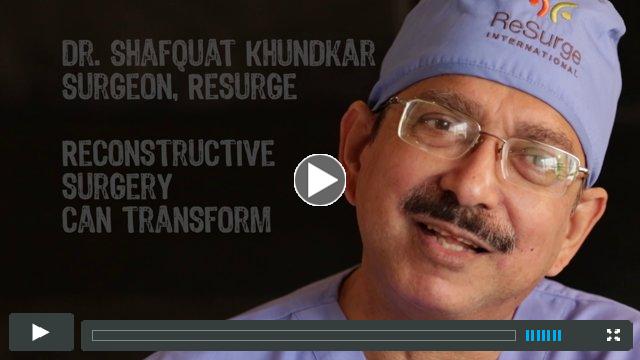 | | Dr Khundkar Discusses Reconstructive Surgery |
After surgery, patients start physical therapy. If you wish for a quick view into this stage of the healing, the short clip below offers a snapshot of Azida's joy after her surgery in Cox's Bazar. She is cared for by Mohan Dangol, a physical therapist who traveled to the clinic from Nepal to volunteer. Mohan's motto is "We mix play with therapy over and over again." As shown in this clip, stretching is critical for many patients who experience burns. 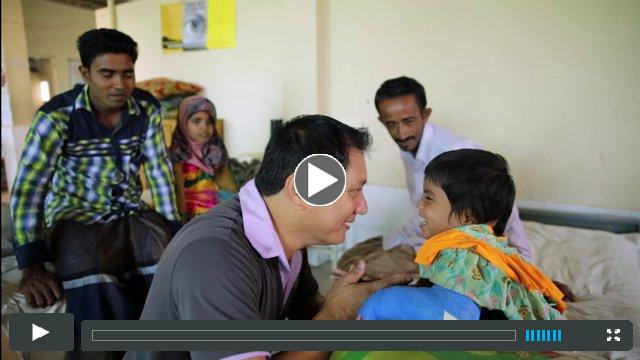 | | Azida's Physical Therapy Session - Cox's Bazar, Bangladesh |
__________
RESURGE INTERNATIONAL
SERVING THE POOR
Tonmoy (Age 19), Burn Survivor, Former ReSurge Patient, Volunteer, Cox's Bazar, Bangladesh
Tonmoy's spirit (portrait shown above) reflects core themes I witnessed repeatedly at the clinic. His story holds transformation, compassion, family sacrifice, and emerging possibility.
Like many other children in Asia, Africa, and other regions in the world, Tonmoy was severely burned in an unfortunate accident in his home. He vividly remembers the moment he almost died.
At age eight, Tonmoy loved to play with his friends and explore arts and other childhood interests. One day, he was engaged in a frenetic game of "hide and seek" with his young cousin in his family's small home. The electricity failed. His house was dark. After searching for his cousin for some time, he found him in the kitchen. He then quietly and secretly approached his cousin's hiding spot. When he was very near his cousin, he whispered "Boo."
Tonmoy Serves As A Clinic Volunteer, Cox's Bazar, Bangladesh
His cousin was startled and aggressively pushed Tonmoy away. Tonmoy tripped and fell. Unfortunately, a large pot of boiling water sat on the surface of the nearby stove. As Tonmoy tumbled on the kitchen floor, scalding hot water severely burned his chest, back, neck, and arms. His family rushed Tonmoy to the local hospital, but adequate care was not available. There were complications, including burn contractions and Tonmoy's potential loss of use of both his arms. He spent many months in the hospital. His family struggled financially to cover the costs for his care and recovery. They sold their small home to help cover their unexpected medical expenses.
Three years later, after a series of ineffective treatments, when Tonmoy was 11 years old, ReSurge International came to Dhaka, Bangladesh to provide free surgery for people with disabling burns. This was 2007. Tonmoy was selected as a patient and received surgical treatment that positively transformed his life.
Today, Tonmoy is in his first year of college. He came to the recent burn clinic to volunteer his time to help other burn patients (image above shows Tonmoy in scrubs). In the future, he hopes to be a doctor or a physical therapist and work with burn patients. His path is unfolding in very positive ways. ReSurge is actively involved in his education and mentorship.  Rabea Basri (Age 17), A Nurse In Training, Hope Hospital, Cox's Bazar, Bangladesh
Rabea is a volunteer nurse at Hope Hospital, the site of ReSurge's recent burn clinic in Bangladesh. She is part of the local medical team that cares for patients pre and post surgery. She is seven months into a year long training program to build her nursing skills while she finishes high school. She has a large family - six sisters and two brothers. She lives with her mother. Her father spends almost all his time working to earn income for the family in Saudi Arabia. She sees her father just once or twice every few years. Leaving the country to find employment in another region is common for many Bangladeshis. Rabea's dream is to study the arts and medicine and care for the poor. That same theme, compassion for the less fortunate, touched me often on this trip.
BANGLADESH
Md Alan, 10 Years Old, Rickshaw Ready, Cox's Bazar, Bangladesh
This was my first trip to Bangladesh, an intensely colorful, densely populated, poor country on the edge of the Bay of Bengal.
Average per capita income is roughly $1,000 a year in Bangladesh - about 1/8th the world average and 1/40th the U.S. per capita figure.
In square miles, Bangladesh is roughly the size of the state of Iowa. Despite this modest geographical scale, the country supports a population of over 160 million people - almost half the population of the entire U.S.

The country gained independence in 1971. It was previously East Pakistan. Today, it's surrounded by India, the Bay of Bengal, and a touch of Myanmar (Burma). The cities are densely packed with concrete buildings and commerce. The garment industry dominates Dhaka and other major urban areas. Rural portions of the country hold a tapestry of rivers and agriculture.
Low Cost Taxi Option, Dhaka, Bangladesh
More than half of the country's population work as farmers. Yet, primary exports come from the clothing and other labor driven, urban-based industries.
Street scenes tend to be chaotic and intense. Infrastructure is often lacking. Commerce is always in motion. The video clip below is from a rural town near Hope Hospital, the site of the burn clinic. The scene is much calmer and less congested than Dhaka. In relative terms, it's "peaceful."
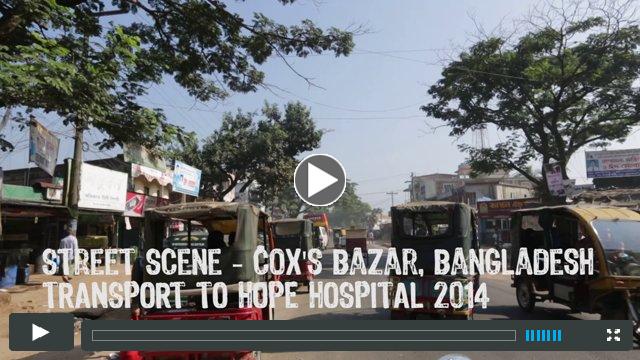 | | Street Scene In Rural Bangladesh |
Bangladesh is sometimes called "the playground of seasons" because it has six (not four) separate seasons, which are referred to as: grismo (summer), barsha (rainy), sharat (autumn), hemanto (cool), sheet (winter), and bashonto (spring).
Bengali and English are the primary languages spoken.
Hospital Staff, Burn Clinic, Hope Hospital, Bangladesh
The great majority of this population holds Muslim beliefs (90%). Most of the remaining community holds Hindu beliefs (9%). Faith is a central part of daily life.
Many women dress conservatively in burqas. Gender roles tend to be highly defined. For many Bangladeshis, prayer is regularly scheduled in the morning, midday, and evening.
Family Gathering, Hope Hospital, Cox's Bazaar, Bangladesh
SURGERY IN LESS DEVELOPED
REGIONS OF THE WORLD
ReSurge International was formed in 1969 through the inspiration and vision of Dr. Donald Laub, a renowned surgeon at Stanford University. He pioneered the idea that reconstructive plastic surgery can renew lives and restore hope in poor countries through mobile medical teams and sustained capacity building.
Over 100,000 ReSurge funded operations and broad scale capacity development evolved. Today, worldwide, ReSurge raises roughly $4 Million a year to continue this philanthropic commitment. ReSurge began work in Bangladesh in 1989 with cleft palette, burn, and other surgeries. Dr. Shafquat, the lead surgeon in the recent 2014 clinic, was a part of the initial ReSurge project. For twenty five years, ReSurge and Dr. Khundkar have collaborated in bringing care to the poor in Dhaka and remote areas of the country.
Surgery With Flashlights After The Power Went Out, Hope Hospital, Bangladesh
Medical care in a country with limited infrastructure is a challenge. The scene above took place in the primary operating room in Hope Hospital. The electrical power had just gone out. The operating room is barely lit through the use of a hand held flashlight and a headlight. The air conditioning also stopped working. The temperature in the room quickly rose. Anesthesiologists monitor the patient's vital signs carefully using backup batteries.
I stood quietly beside the surgery table in my scrubs observing the surgical team. Dr. Khundkar and Dr. Ibrahim did not miss a beat. The nurses were calm and engaged. No one in the room panicked or stopped to demand a different working environment. There was a shared sense that life and important work go forward regardless of daily and hourly challenges and circumstances. Power outages are a reality in Bangladesh. The operation continues. Surgical lights and other modern tools are wonderful, but not always essential.
BURNS
In a poor country with little medical infrastructure and limited health care support, a burn injury can devastate a family. Dr. Khundkar speaks about these challenges in this clip: 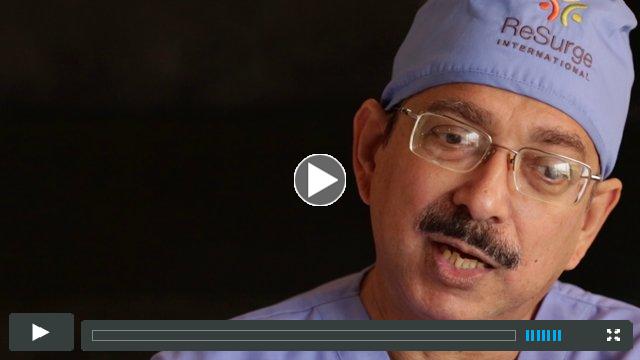 | | Dr Khundkar Discusses The Impact Of Burns |
I was not aware of the crisis burns create in many parts of the world before my Bangladesh experience. In much of Asia, Africa, and other regions of the world, many families cook with gas tanks or wood fired stoves, often near the ground. Loose clothing that many Bangladeshi women and girls wear may easily catch on fire, children often play too near flames, stoves sometimes malfunction and explode, and other common accidents occur. A Child Plays With Fire To Warm His Hands, Early Morning Chill, Cox's Bazaar, Bangladesh
Tragically, even positive steps taken by humanitarian organizations (NGOs), such as mosquito net donations to families living in vulnerable areas for malaria, can contribute to burns. It turns out, most mosquito nets are impregnated with chemicals that help deter mosquitoes. Unfortunately, some of these chemicals may also cause the nets to be flammable.
Potu, Burn Survivor (Cooking Accident), ReSurge Surgery Client, Hope Hospital, Bangladesh
Burns are often unrecognized as a health care crisis particularly for poor women and children, who are already the world's most disadvantaged population. Here are a few highlights from ReSurge International's research assessments: In Bangladesh, more than 350,000 people are affected by burns every year. Roughly 4,000 of these burn victims become permanently disabled and over 25,000 need hospitalization. Young Girls Celebrating An Ambulance Team With Flowers And Prayers, Cox's Bazar, Bangladesh
Ninety-five percent of burn injuries occur in developing countries where prevention programs are often nonexistent and medical care for burns is extremely limited. This causes millions of needless deaths and disabilities, even for relatively minor injuries. Worldwide, over 300,000 people die from burns each year.
Throughout much of the less developed world, effective burn education and prevention programs, improved initial treatment capacity, physical therapy, and surgical intervention all require additional attention and resources. ReSurge continues to work at these goals.
THE COX'S BAZAR BURN CLINIC
A few images and stories from the clinic follow ...
Dr. Rafi Siddique Shares The Clinic Surgery Plan, Hope Hospital, Bangladesh
Given the limited time and resources for this two-week clinic, a group of about five dozen patients were chosen. Careful consideration was given to each case. An additional group of patients was deferred for future clinics. Other patients were sent to alternative medical facilities or counseled with different approaches for their care.
Almost all of the patients had not received adequate medical treatment at the time of their initial injuries. This remains a challenge. Medical resources are highly stretched throughout a country such as Bangladesh and in many other poor regions of the world. 
Azida (Age 4) Awaits Surgery, Hope Hospital, Cox's Bazar, Bangladesh
When Azida was one month old, she was sleeping under a mosquito net in her home. There was a candle near her bed. Her father is not sure if her movement in her bed or a gust of wind caused the candle to fall over. Somehow, the flame from the candle spread and the net caught fire. The chemicals on the net were quite flammable. The net melted. Azida was severely burned.
Unfortunately, immediate treatment options were slim. There are few hospitals near Azida's home and medical care was very expensive for her family.
Azida's father is a day laborer. He works wherever and whenever manual labor is needed - in the fields, factories, construction sites, etc. He generally earns about $4 to $6 U.S. a day.
Azida came to this burn clinic at age four with major elbow, wrist, finger, and shoulder complications. Over time, without proper care, the burns had caused her arm to contract and stiffen. Despite these challenges, her joyful spirit was effusive.

Mustahid Quazi, ReSurge Volunteer, Leads Azida To Surgery, Hope Hospital, Bangladesh
Her surgery took several hours. The long time period between her injury and treatment and the lack of movement in her arm due to contraction from the burns had caused several bones to fuse. As a result, the surgeons were able to open up her hand, wrist, and fingers, but only partially repair her elbow and shoulder. Her case reflects the importance of improvements in initial, immediate treatment. __________
Another patient I remember well is a boy named Rifat. He arrived at the clinic with his father Zakar to pursue surgery on his hands and arms. He came from a small village named "Bashkhali" roughly five hours by bus from the hospital.
He too experienced a burn while he was sleeping. In his case, a kerosene lamp fell over and caught his bed and his mosquito net on fire. Rifat was several months old at the time.
Within a few months, his hands and arms began to contract - a common and challenging outcome from severe burns.
Rifat (Age 9) Awaits Surgery With His Father, Zakar, Hope Hospital, Bangladesh
Through the years, Rifat felt the tremendously harmful negative stigma and teasing many burn victims experience. Other children did not want to play with him. He dreamed of using his hands to eat, study, and play.
Rifat's Hands Were Injured From A Melting Mosquito Net, Hope Hospital, Bangladesh
Rifat's surgery was quite successful. Additional procedures are needed, but he made great strides while we were in Bangladesh. Future clinics in the same area are planned.
In this stage of his treatment, Rifat regained important movements in his hand and arms. It was encouraging to see him coloring and exploring the new mobility he felt a few days after his surgery.
Here's a ReSurge blog post with a portrait I produced shortly after his operation in Cox's Bazar.
 __________
Mohammad came to the clinic with his father (shown praying with his hands on Mohammad's chest below) to continue critical treatment for a severe burn injury he sustained six years ago. When he was eight years old, Mohammad was playing in his village near a road that was under construction. In the midst of the game, one of his friends pushed him. He fell on soft, hot tar on the surface of the new road. The burns were very, very deep. Over time, both his feet were deformed and both his legs contracted. He moved around by crawling on the dirt. Mohammad (Age 14) Post Surgery. His Father Prays For Full Recovery. Hope Hospital
He couldn't easily walk to or attend school and his family had modest resources for treatment. Thus, he spent his days begging at the side of the road. About a year ago, he met Dr. Khundkar and a ReSurge team. They completed an operation that freed one of his legs from the contraction and opened up the muscles and skin in this leg for future movement. The procedure at the recent Cox's Bazar clinic freed his other leg and allowed him to begin walking - initially with crutches and hopefully later without aid. In the image below, he is just beginning to move around on both legs. A splint is still on his right leg from the operation. Crutches are essential. His spirit is uplifted. He speaks about returning to school and developing a career. Mohammed (Age 14) Post Surgery, Hope Hospital, Bangladesh
__________
Hosne's life changed dramatically when she was twelve. She lived in a small village in southeastern Bangladesh. One day, her father and uncle made a secret decision that changed her life forever. Without telling her, they made an agreement to marry her to her cousin who was thirty years old at the time. Money was exchanged and she was taken away from her family. She was held captive in her uncle's home. When she was told of her uncle's and father's plans, she was stunned and confused. She refused to participate. She was whipped and beaten for hours until she agreed to the union. Witnesses from the community formalized the commitment. Through the first few months of marriage, she experienced continued abuse from her new husband and mother-in-law. Apparently, their complaints centered on her inability to properly cook, clean, and care for her new family. She tried to be a capable wife, but she had no training or capacity to meet her new family's needs. She was verbally abused constantly and beaten repeatedly. Hosne (Now Age 28) Before Her Surgery For Acid Burns She Sustained When She Was 12
After months of concern and a realization that the situation was turning worse, her father stepped in and removed her from his brother's (her uncle's) home. Her new husband was angry and shamed. She was afraid. Negotiations took place between her family and her uncle's family to try to end the marriage. Unfortunately, her husband desperately wanted her to return to him and his family. He recognized this was unlikely. In an effort to ensure she was not attractive to other men, he developed a horrific plan.
In the middle of the night, he forced himself into Hosne's father's home while Hosne was asleep. He then pushed his way to her bedside and reached into his pocket for a bottle of chemicals. He poured sulfuric acid over the left side of her face and shoulder. This, she was told, reflected his desire to bring her back to him forever. He believed that no one else would want her once she was disfigured. When she told us her story, it was difficult to hold back a sense of outrage.

Hosne (Age 28) With Her Daughter, Fatima (Age 13), Hope Hospital, Bangladesh
She awoke to a nightmare. Her pain and injuries were severe. Her hospital treatment was long, complicated, and expensive. Her family was deeply financially stretched.
The police came to her home. Questions evolved regarding her injuries. Her uncle's family traded modest funds to support her health care and promises for future financial gifts in exchange for immunity. Her family did not press charges.
Fortunately, the story moved toward a happy ending. After the incident with the acid and severe burns, Hosne was able to formally leave her first husband through a village approved divorce. And, in about a year, at age thirteen, she married another man from her village. She describes her second husband as a kind, supportive, and caring man. She went on to have five healthy children.
Her first husband still lives nearby. It's a long story. The financial promises made after her accident were not kept. He was never charged with a crime. A massive injustice. He too remarried.
Hosne came to the burn clinic with her daughter to take a step toward healing her wounds. She hopes to remove the ridicule and stigma she has endured for sixteen years. It was wonderful to see her strength and hope through all her life challenges. The surgery on her left eye went well. This is the first step of many in her path to reconstruct her face from the burns. The whole ReSurge team was touched by her story.
BUILDING LOCAL CAPACITY FOR SUSTAINED CARE

Dr. Rafi Siddique, Medical Director, Hope Hospital, Bangladesh
One of the most delightful parts of my experience on this trip was my interaction with a young doctor named Rafi Siddique. He brought a contagious smile, enthusiasm, and tremendous hope and passion to his work. He left his home country of Qatar to work in Bangladesh with the poor.
Rafi is focused on health care policy and plans to return to school to pursue a PhD and a leadership role in shaping services for the poor in Asia and other regions of the world. This is a tremendous lifetime challenge.
We sat in the courtyard of the hospital where he works. When asked about his inspiration, he paused and then shared two wonderful quotes: "If you can't fly then run, if you can't run then walk, if you can't walk then crawl, but whatever you do you have to keep moving forward."
Dr. Martin Luther King Jr.
And ..."You don't have to be great to start, but you have to start to be great."
Zig Ziglar
Here's Rafi's version of these inspiring words - link to his video clip. These statements resonate strongly for me. Challenging. Powerful. It made me pause when I heard these quotes in a remote, rural area of Bangladesh shared by a man with no direct connection to the United States. Inspirational ideas and truth cross borders with ease. So often, we feel the issues around us are too difficult and too large to address, too painful to view, too complicated to fully understand. It's easy to feel our individual actions will not make a difference. Yet, so often, through sustained action and commitment from a single individual or group of individuals, through passion and vulnerability, the world shifts and changes.
Rafi is one of those engaged, caring, purpose-filled individuals I deeply admire. He and the other doctors, nurses, and medical volunteers I met on this trip are "quiet heroes."
A TOUCH OF DAILY LIFE
Outside of the burn clinic, I had a chance to visit a nearby school and the beach at Cox's Bazar. I also experienced a touch of Dhaka, the capital of Bangladesh. A few images from my wanderings are shown below.
The girls in the first two pictures below attend a small school. I came to their classroom unannounced without a plan. The administration welcomed me into the classroom. The kids were adorable. We shared stories and they asked lots and lots of questions.
Yes. They are laughing very hard at their crazy, silly, unusual school visitor - that would be me.
Laughter And Joy During My School Visit, Chainda Government Primary School, Bangladesh
A Parting Gift, Chainda Government Primary School, Bangladesh
Daybreak, Coffee And Herb Salesmen, Cox's Bazar Beach, Bangladesh
A Clean Shave, Local Barber Shop, Cox's Bazar, Bangladesh
Railroad Crossing Gate Keepers, Dhaka, Bangladesh
Rickshaws, "Tuk Tuks," And Bicycles, Dhaka, Bangladesh

Shell Salesman At Sunset, Cox's Bazar Beach, Bangladesh
Young Student On The Way To His Madrasah (Religious School), Cox's Bazar, Bangladesh
The Joy Of A Goal, Beach Football (Soccer) With Friends, Cox's Bazar, Bangladesh
Cooks Celebrating The Afternoon Light, Hope Hospital, Bangladesh
THE NEXT GENERATION
ReSurge International is working to build a new generation of surgeons and other health care professionals to support the needs of the poor across the world. A major part of this goal is developing capacity in the countries ReSurge supports. This requires ongoing training, financial support, mentoring, and infrastructure.
Mohan Dangol, a physical therapist, is shown below in the midst of training local hospital staff.
 Mohan Dangol, Physical Therapist From Nepal, Post Op Care, Hope Hospital, Bangladesh
Watching Dr. Ibrahim, Dr. Khundkar, and other doctors work together at the burn clinic in Bangladesh was quite inspirational. They hold tremendous admiration for each other. As mentioned earlier, Dr. Khundkar is one of the most experienced, talented surgeons in Bangladesh. He trained 35 of the total 42 plastic surgeons in the country. He has been a long-term partner with ReSurge.
The ReSurge Surgical Team At Work, Hope Hospital, Bangladesh
Dr. Ibrahim studied under Dr. Khundkar to become the first female reconstructive plastic surgeon in Bangladesh. This is a significant achievement given a strong gender bias and traditional roles for women.
Dr. Ibrahim's compassion for the poor and desire to give and heal and assist others is quite wonderful. In the video clip below, she speaks about her greatest source of inspiration, her grandfather. He founded a hospital for diabetics in Dhaka, Bangladesh and served the poor throughout his life.
She shares one of her grandfather's famous quotes that reflects her beliefs. She speaks about the gifts she receives as a doctor when she participates in the transformation that's possible through reconstructive surgery. She speaks about how fortunate she is to serve.
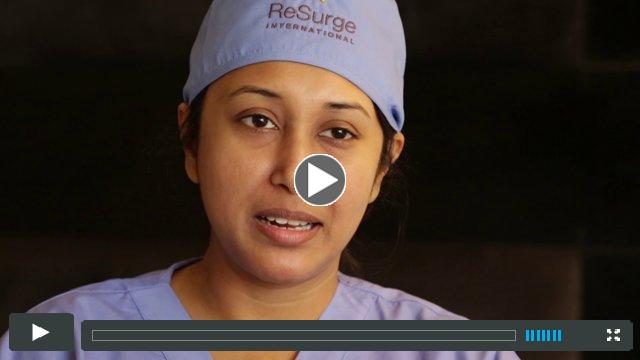 | | Dr. Farzana Ibrahim's Inspiration |
I am grateful for my experience in Bangladesh. Much to remember. Much to reflect on.
LINKS
|